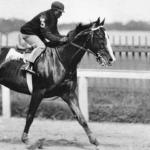
Renegade Had it Made with Big Derby Prep Win at Tampa Bay Downs

For most people, the name King Ranch brings to mind images of a sprawling western ranch filled with cattle and cowboys. But for fans of Thoroughbred racing, King Ranch brings to mind a different image — the image of one of the most influential and successful racing and breeding operations in the history of the sport.
King Ranch had existed for many years before Robert Kleberg Jr., a grandson of King Ranch founder Richard King, assumed his place at the helm of the operation in 1932. Up until that point, King Ranch had not been involved in the Thoroughbred industry — Quarter-Horses were the breed of choice for ranch work — but in 1934, a well-bred Thoroughbred by the name of Chicaro caught Kleberg’s eye, and the purchase of this stallion marked the start of King Ranch’s foray into the Thoroughbred industry.
KING RANCH'S FIRST THOROUGHBRED, CHICARO

In 1935, Kleberg added to the ranch’s stock when he purchased a group of quality fillies and mares from breeder Morton Schwartz at an auction in Saratoga Springs, N.Y. The following year, Schwartz won the Kentucky Derby and Preakness Stakes with Bold Venture, and in 1938, Kleberg purchased Bold Venture to serve as the foundation stallion at King Ranch. This group of horses would launch King Ranch into the stratosphere of the horse racing industry.
BOLD VENTURE

Right off the bat, King Ranch found success at the highest level with Dawn Play, one of the fillies that Kleberg had purchased from Schwartz. Against fillies, Dawn Play won the prestigious Acorn Stakes and Coaching Club American Oaks. She also beat a talented field of colts in the American Derby to be recognized as the champion 3-year-old filly of 1937. Two years later, King Ranch celebrated the first stakes win by a homebred horse when the filly Ciencia won the Santa Anita Derby against males. Then in 1943, the King Ranch filly Too Timely won the Coaching Club American Oaks by an impressive 3½ lengths.
Too Timely’s stakes win was a big success for King Ranch, but the year 1943 would be better remembered in the ranch’s history as the year that Assault was born. A son of Bold Venture, Assault suffered a severe hoof injury early in his life, but amazingly recovered and started racing in 1945. A 12th-place finish in his debut did little to suggest that he would become a star, but he showed gradual improvement as the season progressed — he even won the Flash Stakes at Belmont at odds of 70-1 — and when he made his 3-year-old debut on April 9, 1946, he stamped himself a promising Derby contender by winning the Experimental Free Handicap by 4½ lengths. He would go on to win not only the Kentucky Derby but the Triple Crown as well, and would continue to race with success for several more years.
ASSAULT AT KING RANCH

Before Assault was even retired, King Ranch had struck gold again with Middleground, who won four of his five races as a 2-year-old in 1949, including the prestigious Hopeful Stakes at Saratoga. The following year, Middleground would finish second more often than not, but he made his limited victories count by winning the Kentucky Derby and Belmont Stakes, his only triumphs of the season. If not for Hill Prince, Middleground would have been a Triple Crown winner, as he finished second to that rival in the Preakness Stakes.
Thus, in less than 15 years, King Ranch had gone from being uninvolved in Thoroughbred racing to winning a pair of Kentucky Derbys and a Triple Crown, and those were far from the only successes that the operation enjoyed.
MIDDLEGROUND

At the same time that Assault was winning the Triple Crown and stamping himself an all-time great runner, Kleberg was taking steps to improve the quality of the King Ranch breeding stock by purchasing horses from fellow legend Colonel E.R. Bradley. Among these horses was a filly by the name of But Why Not, who became the champion 3-year-old filly and champion handicap female of 1947 after winning six major stakes races, including the Acorn Stakes, Alabama Stakes, Beldame Handicap, and the Arlington Classic against colts.
Four years after Middleground won the Belmont Stakes, King Ranch was back in the Belmont winner’s circle with High Gun, who had been purchased as a yearling at auction. High Gun proved to be among the best colts of his generation, winning the Peter Pan Handicap, Belmont Stakes, Dwyer Stakes, Synsonby Mile, Manhattan Handicap, and Jockey Club Gold Cup in 1954 to be recognized as the champion 3-year-old male. His campaign in 1955 didn’t yield as many victories, but he still won the Metropolitan Handicap, Brooklyn Handicap and Synsonby Stakes — defeating eventual Horse of the Year Nashua in the latter — on his way to honors as the champion handicap male.
Over the next 20 years, Kleberg would breed dozens of stakes winners for King Ranch, including a bay filly named Gallant Bloom. Born in 1966, Gallant Bloom won three stakes races in 1968, including the prestigious Gardenia Stakes and Matron Stakes, to receive recognition as the Daily Racing Form’s champion 2-year-old filly, and she would return better than ever in 1969, going unbeaten in eight races (one via disqualification) to become champion 3-year-old filly. One of her most impressive wins was a seven-length victory over champion Gamely in the Matchmaker Stakes.
GALLANT BLOOM

Kleberg passed away in 1974. Although his descendants remained involved in the sport and bred stakes winners and champions of their own, Kleberg’s passing for the most part marked the end of King Ranch’s official involvement in racing and breeding. But what a remarkable involvement it was!
Note: This story was originally published in 2015 and has been updated.
Fun Facts